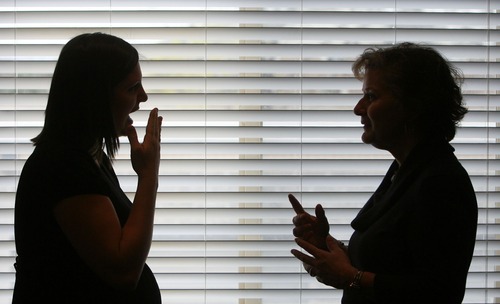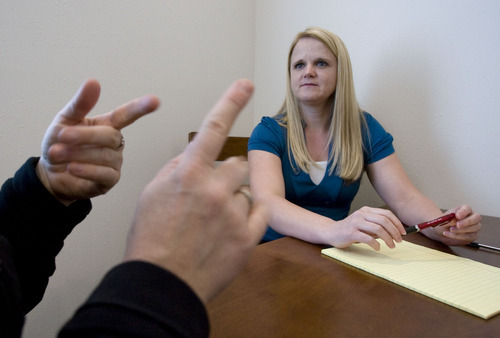This is an archived article that was published on sltrib.com in 2011, and information in the article may be outdated. It is provided only for personal research purposes and may not be reprinted.
At the Sego Lily Center for the Abused Deaf, not a day passes without the staff recalling Penny Williams Calhoun.
Her death is the reason the center exists, the reason people such as Sarah have somewhere to turn when they experience domestic violence and abuse.
Sarah, a pseudonym The Salt Lake Tribune is using for the victim, because she fears retribution, was in a "mixed" marriage — she is deaf, but her ex-husband can hear. Early in their marriage, he moved Sarah and their four children to another state to isolate her from friends and family. Then he began threatening to kill her and their fifth unborn child, telling Sarah she would never know the attack was coming because she wouldn't hear it.
With the help of family, Sarah and her children moved back to Utah and was referred to the Sego Lily Center, which helped her get a protective order and provided other services.
But within months, there was a new nightmare: She learned her children had been sexually abused by their father.
One of her children forgot his grandmother could hear and began talking to a sibling about what their father had done to them.
"I told the children I had never seen him hurt them," Sarah said. "They said, 'He hurt us while you were sleeping because you couldn't hear us screaming for help. And he told us if we tell, he will kill you and all of us.' "
Sarah's ex-husband was later convicted and sentenced to 60 years to life in prison for the sexual assault of a child.
"Our family still lives in fear," Sarah said, "but Sego Lily has helped me get the resources that I need to move on."
The center was created 11 years ago after Calhoun was killed by her estranged husband, a murder that highlighted the need for domestic-violence services tailored to the deaf community.
Calhoun was 32 and, after struggling with substance abuse, was putting together a new life for herself. Calhoun, who was born deaf, was earning a psychology degree, with plans to work as a substance-abuse counselor in the deaf community.
After less than a year in a physically abusive marriage, she had separated from her husband, who was also deaf. But he continued to harass her, and in September 1999, she received a protective order. But perhaps because of the language barrier, it was unclear to her how to have it enforced. She also never received a safety plan to follow in the critical period after the order was issued, said Joene Nicolaisen, Sego Lily's executive director.
Four days later, Calhoun's estranged husband broke into her Salt Lake City apartment. Calhoun's boyfriend escaped through a window and called police, but officers arrived to hear a series of gunshots and later found both dead inside.
Police were initially stymied on how to make contact with the couple, since they couldn't knock at the door, call on the telephone or use a bullhorn. They eventually called Calhoun's number using a teletype machine, but no one answered. When police entered the apartment hours later, they found Calhoun had been shot by her estranged husband, who then killed himself.
At the time, the only domestic-violence center in the country catering to victims who are deaf or deaf and blind was in Seattle. Its founder, Marilyn Smith, who is deaf, received a $300,000 grant to seed similar programs in 15 other cities, and Calhoun's death prompted her to turn her attention to Utah.
She wrote a letter that eventually reached Nicolaisen, who is deaf and, at the time, was a graduate student intent on becoming a mental-health counselor. Instead, she put her education to use launching the Sego Lily Center.
"It touched me so much, and I saw a great need," Nicolaisen said.
Before the center's creation, deaf people who experienced domestic violence often felt more isolated when they sought help at shelters, which typically aren't equipped to deal with someone who can't hear.
"The abusive situation felt better because they had greater communication," said Stephanie Mathis, Sego Lily's program director, who is also deaf. "We're trying to reduce those barriers."
Today, the Sego Lily Center has five staff members in Salt Lake County and one in southern Utah who provide advocacy, support and educational services to Utah's deaf community, which Mathis estimates at approximately 220,000 people of all ages who are deaf or hard of hearing. Of that number, approximately 5,000 are "culturally deaf " — that is, they rely on American Sign Language to communicate and identify themselves as belonging to a cultural group, not as having a disability.
"That five thousand is the most underserved," she said.
The center works with about 30 people a year in the Salt Lake Valley, Nicolaisen said, and another 20 in southern Utah.
"We have so few social workers — five in the state — who are fluent in American Sign Language," Nicolaisen said. "Plus, there are so many barriers for deaf people seeking mental-health services, as providers often do not provide interpreters."
Abuse often takes a different form when a victim is deaf. An abuser may target a victim's ears, eyes or hands, which a deaf person relies on to communicate, or refuse to sign or relay conversations. It's also common for an abuser to target devices a deaf or hard-of-hearing person relies on to communicate.
Mathis said that during intake interviews, many shelter workers fail to ask about whether assistive devices were taken or damaged during an attack, or try to help deaf victims without calling on an interpreter or support services offered by Sego Lily.
Nicolaisen said one deaf woman was accepted into a transitional-housing shelter and was initially provided with interpreter services. Staff waived a weekly class residents are required to attend, and instead gave the woman a workbook to complete. The woman's literacy skills were subpar, which made doing the work difficult.
At times, shelter staff told the woman to "just lip read" and even asked her oldest child to interpret for her, Nicolaisen said.
"That's not appropriate. And letting the woman skip out on the classes is not the success we want," she said.
The center provides help to people in immediate crisis as well as those who have unresolved trauma from abuse experienced during childhood, Nicolaisen said. Deaf children may have communication barriers that make it difficult to object to, or report, abuse. Some 90 percent of those who are deaf have parents who can hear, but most of those parents don't know sign language.
brooke@sltrib.comTwitter: @Brooke4Trib —
Sego Lily working on new police guidelines
Executive DirectorJoene Nicolaisen is currently working with the South Salt Lake Police Department to create a model protocol for police responding to domestic-violence incidents involving someone who is deaf — a model she hopes other departments will adopt.





